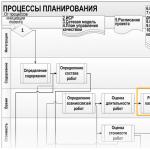The highest authority in the corporation is. Management in a corporation. Other conditions for the exercise of powers
Civil Code of the Russian Federation:
Article 65.3 of the Civil Code of the Russian Federation. Management in a corporation
1. The supreme body of a corporation is the general meeting of its participants.
In non-profit corporations and production cooperatives with more than a hundred participants, the supreme body may be a congress, conference or other representative (collegial) body determined by their charters in accordance with the law. The competence of this body and the procedure for making decisions are determined by this Code, other laws and the charter of the corporation.
2. Unless otherwise provided by this Code or other law, the exclusive competence of the supreme body of the corporation includes:
determination of priority areas of the corporation’s activities, principles of formation and use of its property;
approval and amendment of the corporation's charter;
determining the procedure for admission to the corporation's membership and exclusion from its participants, except in cases where such a procedure is determined by law;
formation of other bodies of the corporation and early termination of their powers, if the charter of the corporation in accordance with the law does not include this power within the competence of other collegial bodies of the corporation;
approval of annual reports and accounting (financial) statements of the corporation, if the charter of the corporation in accordance with the law does not include this authority within the competence of other collegial bodies of the corporation;
making decisions on the creation of other legal entities by the corporation, on the participation of the corporation in other legal entities, on the creation of branches and on the opening of representative offices of the corporation, except for cases where the charter of a business company in accordance with the laws on business companies makes such decisions on these issues within the competence of other collegial bodies of the corporation;
making decisions on the reorganization and liquidation of the corporation, on the appointment of a liquidation commission (liquidator) and on approval of the liquidation balance sheet;
election of an audit commission (auditor) and appointment of an audit organization or individual auditor of the corporation.
The law and the corporation's constituent document may assign the resolution of other issues to the exclusive competence of its supreme body.
Issues referred by this Code and other laws to the exclusive competence of the highest body of the corporation cannot be transferred by it for resolution to other bodies of the corporation, unless otherwise provided by this Code or other law.
3. A sole executive body (director, general director, chairman, etc.) is formed in the corporation. The charter of a corporation may provide for the granting of the powers of a sole executive body to several persons acting jointly, or the formation of several sole executive bodies acting independently of each other (paragraph three of paragraph 1 of Article 53). Both an individual and a legal entity can act as the sole executive body of a corporation.
In cases provided for by this Code, other law or the charter of a corporation, a collegial executive body (board, directorate, etc.) is formed in the corporation.
The competence of the bodies of the corporation specified in this paragraph includes resolving issues that are not within the competence of its supreme body and the collegial management body created in accordance with paragraph 4 of this article.
4. Along with the executive bodies specified in paragraph 3 of this article, the corporation may establish, in cases provided for by this Code, another law or the corporation’s charter, a collegial management body (supervisory or other board) that controls the activities of the executive bodies of the corporation and performs other functions. functions assigned to it by law or the corporation's charter. Persons exercising the powers of sole executive bodies of corporations and members of their collegial executive bodies cannot constitute more than one quarter of the composition of collegial management bodies of corporations and cannot be their chairmen.
Members of the corporation's collegial management body have the right to receive information about the activities of the corporation and get acquainted with its accounting and other documentation, demand compensation for losses caused to the corporation (), challenge transactions made by the corporation on the grounds provided for in Article 174 of this Code or laws on corporations of certain organizational and legal forms , and demand the application of the consequences of their invalidity, as well as demand the application of the consequences of the invalidity of void transactions of the corporation in the manner established by paragraph 2 of Article 65.2 of this Code.
In non-profit corporations and production cooperatives with more than a hundred participants, the supreme body may be a congress, conference or other representative (collegial) body determined by their charters in accordance with the law. The competence of this body and the procedure for making decisions are determined by this Code, other laws and the charter of the corporation.
2. Unless otherwise provided by this Code or other law, the exclusive competence of the supreme body of the corporation includes:
Determining the priority areas of the corporation’s activities, the principles of formation and use of its property;
Approval and amendment of the corporation's charter;
Determining the procedure for admission to the corporation's membership and exclusion from among its participants, except in cases where such a procedure is determined by law;
Formation of other bodies of the corporation and early termination of their powers, if the charter of the corporation in accordance with the law does not include this power within the competence of other collegial bodies of the corporation;
Approval of annual reports and accounting (financial) statements of the corporation, if the charter of the corporation in accordance with the law does not include this power within the competence of other collegial bodies of the corporation;
Making decisions on the creation of other legal entities by the corporation, on the participation of the corporation in other legal entities, on the creation of branches and on the opening of representative offices of the corporation, except for cases where the charter of a business company in accordance with the laws on business companies makes such decisions on these issues within the competence of other collegial bodies of the corporation;
Making decisions on the reorganization and liquidation of the corporation, on the appointment of a liquidation commission (liquidator) and on approval of the liquidation balance sheet;
Election of the audit commission (auditor) and appointment of an audit organization or individual auditor of the corporation.
The law and the corporation's constituent document may assign the resolution of other issues to the exclusive competence of its supreme body.
Issues referred by this Code and other laws to the exclusive competence of the highest body of the corporation cannot be transferred by it for resolution to other bodies of the corporation, unless otherwise provided by this Code or other law.
3. A sole executive body (director, general director, chairman, etc.) is formed in the corporation. The charter of a corporation may provide for the granting of the powers of a sole executive body to several persons acting jointly, or the formation of several sole executive bodies acting independently of each other (paragraph three of paragraph 1 of Article 53). Both an individual and a legal entity can act as the sole executive body of a corporation.
In cases provided for by this Code, other law or the charter of a corporation, a collegial executive body (board, directorate, etc.) is formed in the corporation.
The competence of the bodies of the corporation specified in this paragraph includes resolving issues that are not within the competence of its supreme body and the collegial management body created in accordance with paragraph 4 of this article.
4. Along with the executive bodies specified in paragraph 3 of this article, the corporation may establish, in cases provided for by this Code, another law or the corporation’s charter, a collegial management body (supervisory or other board) that controls the activities of the executive bodies of the corporation and performs other functions. functions assigned to it by law or the corporation's charter. Persons exercising the powers of sole executive bodies of corporations and members of their collegial executive bodies cannot constitute more than one quarter of the composition of collegial management bodies of corporations and cannot be their chairmen.
Members of the corporation's collegial management body have the right to receive information about the activities of the corporation and get acquainted with its accounting and other documentation, demand compensation for losses caused to the corporation, challenge transactions made by the corporation on the grounds provided for in Article 174 of this Code or laws on corporations of certain organizational and legal forms, and demand the application of the consequences of their invalidity, as well as demand the application of the consequences of the invalidity of void transactions of the corporation in the manner established by paragraph 2 of Article 65.2 of this Code.
In accordance with the new legislation, the corporation is creating:
- - general meeting;
- - sole executive body;
- - other organs.
The highest body of the corporation is the general meeting of its participants (Article 65.3 of the Civil Code of the Russian Federation). In non-profit corporations and production cooperatives with more than 100 participants, the supreme body may be a congress, conference or other representative (collegial) body determined by their charters in accordance with the law. The competence of this body and the procedure for making decisions are determined by law and the charter of the corporation.
Unless otherwise provided by the Civil Code of the Russian Federation or other law, the exclusive competence of the highest body of the corporation includes:
- - determination of priority areas of the corporation’s activities, principles of formation and use of its property;
- - approval and amendment of the corporation’s charter;
- - determining the procedure for admission to the corporation’s membership and exclusion from among its participants, except in cases where such a procedure is determined by law;
- - formation of other bodies of the corporation and early termination of their powers, if the charter of the corporation in accordance with the law does not include this power within the competence of other collegial bodies of the corporation;
- - approval of annual reports and accounting (financial) statements of the corporation, if the charter of the corporation in accordance with the law does not include this authority within the competence of other collegial bodies of the corporation;
- - making decisions on the creation of other legal entities by the corporation, its participation in other legal entities, the creation of branches and the opening of representative offices of the corporation, except for cases where the charter of a business company in accordance with the laws on business companies makes such decisions on these issues within the competence of other collegial bodies of the corporation;
- - making decisions on the reorganization and liquidation of the corporation, appointing a liquidation commission (liquidator) and approving the liquidation balance sheet;
- - election of an audit commission (auditor) and appointment of an audit organization or individual auditor of the corporation.
The law and the corporation's constituent document may assign the resolution of other issues to the exclusive competence of its supreme body.
Issues referred by the Civil Code of the Russian Federation and other laws to the exclusive competence of the highest body of the corporation cannot be transferred by it for resolution to other bodies of the corporation, unless otherwise provided by the Civil Code of the Russian Federation or other law.
A corporation has a sole executive body (director, general manager, chairman, etc.). The charter of a corporation may provide for the granting of the powers of a sole executive body to several persons acting jointly, or the formation of several sole executive bodies acting independently of each other (paragraph 3, clause 1, article 53 of the Civil Code of the Russian Federation). Both an individual and a legal entity can act as the sole executive body of a corporation.
In cases provided for by the Civil Code of the Russian Federation, another law or the charter of a corporation, a collegial executive body (board, directorate, etc.) is formed in the corporation.
The competence of these bodies of the corporation includes resolving issues that are not within the competence of its supreme body and created in accordance with clause 4 of Art. 65.3 of the Civil Code of the Russian Federation of a collegial governing body.
Along with the indicated executive bodies, a corporation may, in cases provided for by the Civil Code of the Russian Federation, another law or the corporation's charter, create a collegial management body (supervisory or other board) that controls the activities of the executive bodies of the corporation and performs other functions assigned to it by law or the corporation's charter . Persons exercising the powers of sole executive bodies of corporations and members of their collegial executive bodies cannot constitute more than 1/4 of the composition of collegial management bodies of corporations and cannot be their chairmen.
Members of the collegial management body of a corporation have the right to receive information about the activities of the corporation and get acquainted with its accounting and other documentation, demand compensation for losses caused to the corporation (Article 53.1 of the Civil Code of the Russian Federation), challenge transactions made by the corporation on the grounds provided for in Art. 174 of the Civil Code of the Russian Federation or laws on corporations of certain organizational and legal forms, and demand the application of the consequences of their invalidity, as well as demand the application of the consequences of the invalidity of void transactions of the corporation in the manner established by clause 2 of Art. 65.2 of the Civil Code of the Russian Federation.
New edition of Art. 65.3 Civil Code of the Russian Federation
1. The supreme body of a corporation is the general meeting of its participants.
In non-profit corporations and production cooperatives with more than a hundred participants, the supreme body may be a congress, conference or other representative (collegial) body determined by their charters in accordance with the law. The competence of this body and the procedure for making decisions are determined by this Code, other laws and the charter of the corporation.
2. Unless otherwise provided by this Code or other law, the exclusive competence of the supreme body of the corporation includes:
determination of priority areas of the corporation’s activities, principles of formation and use of its property;
approval and amendment of the corporation's charter;
determining the procedure for admission to the corporation's membership and exclusion from its participants, except in cases where such a procedure is determined by law;
formation of other bodies of the corporation and early termination of their powers, if the charter of the corporation in accordance with the law does not include this power within the competence of other collegial bodies of the corporation;
approval of annual reports and accounting (financial) statements of the corporation, if the charter of the corporation in accordance with the law does not include this authority within the competence of other collegial bodies of the corporation;
making decisions on the creation of other legal entities by the corporation, on the participation of the corporation in other legal entities, on the creation of branches and on the opening of representative offices of the corporation, except for cases where the charter of a business company in accordance with the laws on business companies makes such decisions on these issues within the competence of other collegial bodies of the corporation;
making decisions on the reorganization and liquidation of the corporation, on the appointment of a liquidation commission (liquidator) and on approval of the liquidation balance sheet;
election of an audit commission (auditor) and appointment of an audit organization or individual auditor of the corporation.
The law and the corporation's constituent document may assign the resolution of other issues to the exclusive competence of its supreme body.
Issues referred by this Code and other laws to the exclusive competence of the highest body of the corporation cannot be transferred by it for resolution to other bodies of the corporation, unless otherwise provided by this Code or other law.
3. A sole executive body (director, general director, chairman, etc.) is formed in the corporation. The charter of a corporation may provide for the granting of the powers of a sole executive body to several persons acting jointly, or the formation of several sole executive bodies acting independently of each other (paragraph three of paragraph 1 of Article 53). Both an individual and a legal entity can act as the sole executive body of a corporation.
In cases provided for by this Code, other law or the charter of a corporation, a collegial executive body (board, directorate, etc.) is formed in the corporation.
The competence of the bodies of the corporation specified in this paragraph includes resolving issues that are not within the competence of its supreme body and the collegial management body created in accordance with paragraph 4 of this article.
4. Along with the executive bodies specified in paragraph 3 of this article, the corporation may establish, in cases provided for by this Code, another law or the corporation’s charter, a collegial management body (supervisory or other board) that controls the activities of the executive bodies of the corporation and performs other functions. functions assigned to it by law or the corporation's charter. Persons exercising the powers of sole executive bodies of corporations and members of their collegial executive bodies cannot constitute more than one quarter of the composition of collegial management bodies of corporations and cannot be their chairmen.
Members of the corporation's collegial management body have the right to receive information about the activities of the corporation and get acquainted with its accounting and other documentation, demand compensation for losses caused to the corporation (Article 53.1), challenge transactions made by the corporation on the grounds provided for in Article 174 of this Code or laws on corporations of individual organizational- legal forms, and demand the application of the consequences of their invalidity, as well as demand the application of the consequences of the invalidity of void transactions of the corporation in the manner established by paragraph 2 of Article 65.2 of this Code.
Concept and functions of the supreme body of a corporation
A corporation is an organized system, the main function of which is management, designed, in accordance with legal requirements, to regulate and control the activities of the corporation.
The corporate governance process is aimed at protecting the interests of the corporation and its participants, increasing the efficiency of the organization.
Main goals, functions and features of management:
- Protecting shareholder equality.
- Protection of the rights of all shareholders.
- Providing the necessary information related to the activities of the corporation.
- Compliance with the law in the activities of the corporation.
- Administration system control.
- Protection of the rights of interested parties.
In a corporation, the highest governing body is the meeting of the corporation's participants. If we are talking about an organization with more than 100 participants (non-profit organizations, production cooperatives), the main governing body is a conference, congress or other body that will act on the basis of constituent documentation and legal norms.
The specifics of the formation of such bodies are set out in the provisions of the Civil Code.
The powers and competence of management bodies depend on:
- Norms of civil legislation.
- Charter documentation of the corporation.
- Laws and regulations.
The governing bodies are also:
- The supervisory body is the board of directors.
- The executive body is individual or collegial.
- The Audit Commission is a body for exercising internal control over activities in the financial sector.
The management of a corporation is based on the principle of dualism - the distribution of functions of supervision and management, as an important feature of the organization. An important principle is the need to form an executive body for the management of the corporation.
Monitoring the activities of executive bodies is carried out by supervisory bodies formed by decision of the council of participants.
The concept and content of the exclusive competence of the supreme body of the corporation
The exclusive competence of the highest body of the corporation includes issues regarding the adoption of major decisions and changes in the activities and functioning of the corporation.
According to the legislation, the powers of the corporation’s management bodies include:
- Making changes to the statutory documentation.
- Identification of priorities in the activities of the corporation.
- Determining the rules and procedure for admitting participants to the corporation.
- Approval and verification of documentation and reporting.
- Formation of various executive and other bodies of the enterprise, based on need.
- Making a decision to create an audit body for internal control.
- Making and approving decisions regarding the formation of legal entities and branches.
- Making a decision to liquidate a corporation.
- Making a decision to reorganize the corporation.
- Concluding an agreement with an audit company for the purpose of undergoing an external audit procedure.
These powers set out in the legislation are not limited. Additional rights and responsibilities of the corporation's highest governing body may be set forth in the enterprise's constituent documentation.
Problems that fall within the exclusive competence of the highest management body of the corporation cannot be transferred to other bodies - this norm is supported by the provisions of the Civil Code of the Russian Federation.
An exception may be cases when a different procedure for resolving issues is set out in the internal documentation of the corporation. The executive competence of the council of participants may include a wide range of issues that are not specified in civil legislation, but are provided for by the constituent documentation.
The concept and competence of the sole executive body
The law provides for the right to form a sole executive body, which is represented by individuals or legal entities, created to perform the functions of protecting the interests of the corporation and monitoring its activities. Such bodies include:
- General Director;
- Directors;
- Chairman.
The statutory documentation may delegate the powers of the sole executive body to several persons, if there is such a need. The persons to whom these rights are assigned must act jointly in the interests of the corporation.
It is also possible to form several individual bodies that will function autonomously, independently of each other and solve the problems of the corporation.
A collegial executive body - the directorate or board - is created for the purpose of performing tasks that are not included in the list of issues of the exclusive competence of the highest management body of the corporation.
Concept, competence and functions of a collegial governing body
Article 65 of the Civil Code of the Russian Federation states that the highest governing body of a corporation may initiate the formation of sole and collegial executive bodies.
A collegial executive body is a management body of a non-profit or commercial enterprise that is subordinate to the highest management instrument and acts within the framework of the law, carrying out the actions set forth in the corporation’s Charter and civil law.
Its competence does not extend to problems that only the highest management body has the right to solve.
Typology of collegial bodies:
- Information body: created to carry out contacts between the heads of structural divisions of the corporation.
- Advisory body: created to solve certain problems. This body cannot replace others - it is formed to complement their activities.
- A body created to make decisions and having the appropriate powers.
- Control body.
The list of powers and rights of these executive bodies includes problems that are not within the exclusive competence of the highest instrument of corporate management.
According to the rules of law, powers that fall within the exclusive competence of the council of participants cannot be transferred to other bodies.
The formation process, the list of powers of the executive bodies, and the specifics of their activities are set out in the corporation’s Charter. Examples of collegial executive bodies are the directorate and board of a corporation.
Their main function is control over the activities of the corporation. Other functions may be transferred to a collegial body by including them in the corporation’s Charter.
List and features of the rights of collegial bodies:
- Receive complete information about the activities of the corporation.
- Make demands for compensation for losses caused to the corporation.
- On the basis of the law, demand to challenge a transaction that was made by a corporation in violation of the interests of the participants of this corporation.
The number of members of collegial executive bodies should not exceed a quarter of the total composition of the management instruments of a collegial-type enterprise. These individuals also cannot be chairmen of corporations.
The main goals of the creation and operation of collective bodies are to contribute to increasing the efficiency of the corporation, protecting the rights of the corporation's participants, increasing the coherence of the work of the corporation's bodies, and solving problems that are within their competence in the constituent documentation.






